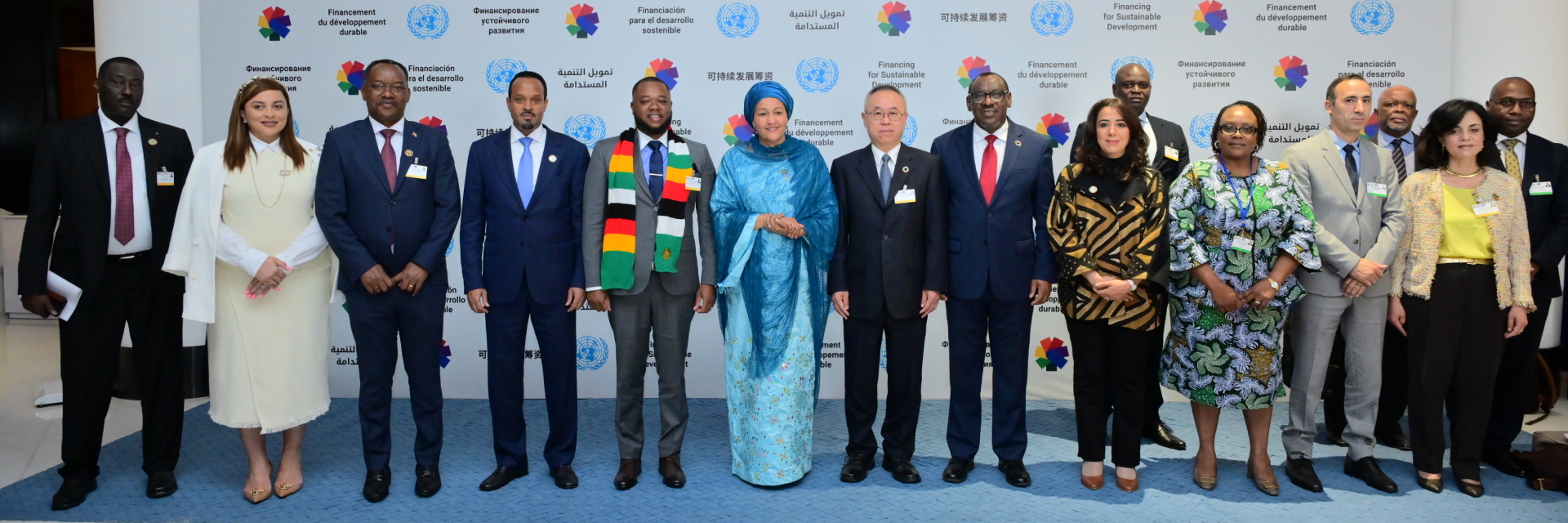First Preparatory Committee meeting of the Fourth International Conference on Financing for Development concludes in Addis Ababa with renewed focus on bridging gaps in SDG financing and delivering international financial architecture reform
Addis Ababa, 26 July 2024 – Dozens of finance and foreign ministers met this week to call for radical action to reform the international financial architecture, empower developing countries in international institutions and channel trillions of dollars towards sustainable development in Africa and other developing countries.
Nine years after the historic agreement on financing for development, the Addis Ababa Action Agenda, United Nations Member States once again convened in Addis Ababa, Ethiopia, to renew the push for sustainable development financing and the Sustainable Development Goals (SDGs).
“Faced with sky-high debt burdens and costs of capital, developing countries have limited prospects of financing the Sustainable Development Goals,” stated António Guterres, Secretary-General of the United Nations in a video message to the conference. He continued: “The Fourth International Conference on Financing for Development provides a unique opportunity to tackle these challenges head on. It opens the door for world leaders to adopt ambitious reforms to deliver affordable long-term financing at scale – and deliver the SDG Stimulus. And it presents a unique opportunity to reform an international financial system that is outdated, dysfunctional and unfair.”
After four years of a series of global shocks – including the COVID-19 pandemic, geopolitical conflicts and economic instability – the SDG financing gap for developing countries has ballooned to USD 4 trillion annually. The financing gap and accompanying debt challenges have worsened poverty and inequality, putting the world off track to meet international targets set in 2015. The challenges countries face in raising sufficient resources have laid bare structural flaws in the international financial architecture and accelerated calls for reforms.
“This meeting provided the opportunity to take stock of the steps we must take to fill the financing gaps and meet the development needs of all people around the world,” said Mr. Li Junhua, the Under-Secretary-General of the United Nations Department of Economic and Social Affairs (UN DESA), and Secretary-General of the FfD4 conference. “The ministers, experts and other stakeholders that gathered here in Addis Ababa made clear that we cannot continue with business as usual and must dramatically reshape the international financial system to ensure investment where it is most needed.”
Ministers and global experts unveiled proposals for reforming the rules and governance of international taxation, and for addressing countries facing debt crises, including through new international mechanisms to resolve situations of sovereign debt default.
“The international financial architecture created nearly 80 years ago needs to be reformed to respond to the most pressing challenges of African countries in a more effective and inclusive manner,” said Mr. Claver Gatete, Executive Secretary of the United Nations Economic Commission for Africa. “African countries are taking a leadership role in pressing for changes to global tax and financial systems, and they are clear that the international system needs to better support their sustainable development aspirations.”
The Preparatory Committee meeting brought together representatives of at least 103 countries, including high-level representatives, as well as representatives of multilateral development banks, United Nations system entities and other intergovernmental organizations, the private sector and non-governmental organizations. Almost 800 participants discussed the full range of financing issues, including debt, taxation, trade, private finance, development cooperation, technology and data.
The five-day meeting was the first of four preparatory meetings to be held ahead of the Fourth International Conference on Financing for Development (FfD4) Conference taking place in Sevilla, Spain, in 2025, with a mandate from the UN General Assembly to support reform of the international financial architecture.
Subsequent sessions of the Preparatory Committee will be held in New York in December 2024, and in February and April in 2025. A one-day intersessional multi-stakeholder hearing will also be convened in New York in October 2024 as part of the preparatory process for the Conference.
Notes to Editors:
-
The Government of Ethiopia hosted the Third International Conference on Financing for Development (FfD3) in 2015 and is hosting the first session of the Preparatory Committee (PrepCom) for the Fourth International Conference on Financing for Development (FfD4).
-
An intergovernmental Preparatory Committee was established by the General Assembly in its resolution 78/271, to make the organizational, procedural and substantive preparations for the Fourth International Conference on Financing for Development.
-
The Fourth International Conference on Financing for Development will take place in Sevilla, Spain, in June 2025. The conference is mandated to support reform of the international financial architecture.
-
The PrepCom meeting was opened by H.E. Mr. Ahmed Shide, Minister of Finance of Ethiopia, and included a keynote address by the United Nations Deputy Secretary General Ms. Amina Mohammed. Welcome remarks were delivered by H.E. Mr. Taye Atskeselassie, Minister of Foreign Affairs of Ethiopia.
Media contacts:
-
Sophie Denekew, UN Economic Commission for Africa | Denekews.uneca@un.org
-
Peter Chowla, UN Department of Economic and Social Affairs | WhatsApp: +1 646.623.6428 | chowla@un.org
Issued by:
Communications Section
Economic Commission for Africa
PO Box 3001
Addis Ababa
Ethiopia
Tel: +251 11 551 5826
E-mail: eca-info@un.org

